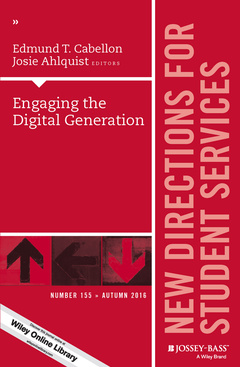Description
Engaging the Digital Generation
New Directions for Student Services, Number 155
J–B SS Single Issue Student Services Series
Coordinators: Cabellon Edmund T., Ahlquist Josie
Language: English
Subject for Engaging the Digital Generation :
Keywords
editors; technology; professionals; perspective; historical; affairs; student; use; digital; julie paynekirchmeier; drastically; tools; changes; highlight; administrators
112 p. · 14.5x22.6 cm · Paperback
Description
/li>Contents
/li>Biography
/li>
This volume explores ways practitioners can engage the digital generation of students and colleagues on their campuses and beyond. Topics covered include:
- Student affairs administrators use of digital technology and how to develop and utilize their digital identities
- Increasing digital fluency and creating a more intentional digital mindset among senior student affairs officers
- College student development in digitized spaces and the application of digital data in student engagement efforts
- The development of guiding documents to inform digital and social strategies.
Edmund T. Cabellon, Josie Ahlquist
1. A Historical Perspective on Student Affairs Professionals Use of Digital Technology 11
Edmund T. Cabellon, Julie Payne–Kirchmeier
Digital technology tools have evolved drastically since 2005. Authors of this chapter highlight these changes and present a historical perspective on how student affairs administrators used digital technology tools in the past and how this history will impact future technology use.
2. The Digital Identity of Student Affairs Professionals 29
Josie Ahlquist
Social media tools challenge the thin line between personal and professional. In this chapter, the author proposes a blended holistic digital identity for student affairs professionals that recognizes the ACPA/NASPA Student Affairs Technology competency, formation of a digital decision–making model, and utilization of personal learning networks.
3. A Strategic Necessity: Building Senior Leadership s Fluency in Digital Technology 47
Kara Kolomitz, Edmund T. Cabellon
Senior student affairs leaders who intentionally develop a digital mindset are committed to the academy s ongoing evolution and support of its faculty, staff, and students. In this chapter, the authors describe how advancing SSAO s digital fluency is the key to developing current staff through their digital example.
4. College Student Development in Digital Spaces 59
Paul Gordon Brown
College student development theory serves as foundational knowledge in the field of student affairs. In this chapter, the author explores the impact of social and digital technologies on college students by applying theory differently and re–examining it for the digital age.
5. Student Engagement Through Digital Data 75
Liz Gross, Jason L. Meriwether
Fundamentally, engaging students is at the core of student affairs work. In this chapter, the authors highlight various digital data sources that might uncover contemporary student engagement efforts to inform a student affairs division s initiatives in person and online.
6. Setting the Course: Strategies for Writing Digital and Social Guidelines 91
Laura A. Pasquini
Ultimately, student affairs educators need guiding documents to help inform their digital engagement practice. In this chapter, the author outlines specific recommendations and strategies for administrators who will steward digital technology and communication guidelines.
INDEX 105
Volume Editors:
Edmund T. Cabellon is the assistant to the vice president of student affairs and enrollment management at Bridgewater State University and the former co-chair of ACPA's Presidential Task Force on Digital Technology.
Josie Ahlquist is an adjunct faculty at Florida State University, Undergraduate Certificate in Leadership Studies program and independent digital leadership educator and researcher.
Series Editors:
Susan R. Jones is an associate professor and section head in the Higher Education and Student Affairs Program at The Ohio State University.
Sherry K. Watt is an associate professor of higher education and student affairs at the University of Iowa.




